Sociology Essay: Analyzing the Negative Impacts of an Election
VerifiedAdded on 2023/03/17
|9
|1988
|45
Essay
AI Summary
This sociology essay examines the multifaceted negative impacts of elections on countries, drawing on various sources to analyze issues such as election fraud, economic downturns, and social chaos. The essay begins by defining elections and their importance in democratic societies, then delves into the positive aspects of elections, such as expressing political preferences and protecting citizen interests, while also highlighting their ability to prevent monopolies of authority. However, the core of the essay focuses on the negative consequences, including cheating, economic instability, and the potential for violence and social unrest. The author proposes solutions like mail-in voting and email voting to mitigate these issues. The paper references multiple scholarly sources to support its arguments and provides a comprehensive overview of the challenges facing the electoral process and its impact on society. The essay concludes by summarizing the key arguments and emphasizing the need for addressing the negative impacts to ensure a fair and effective democratic process.
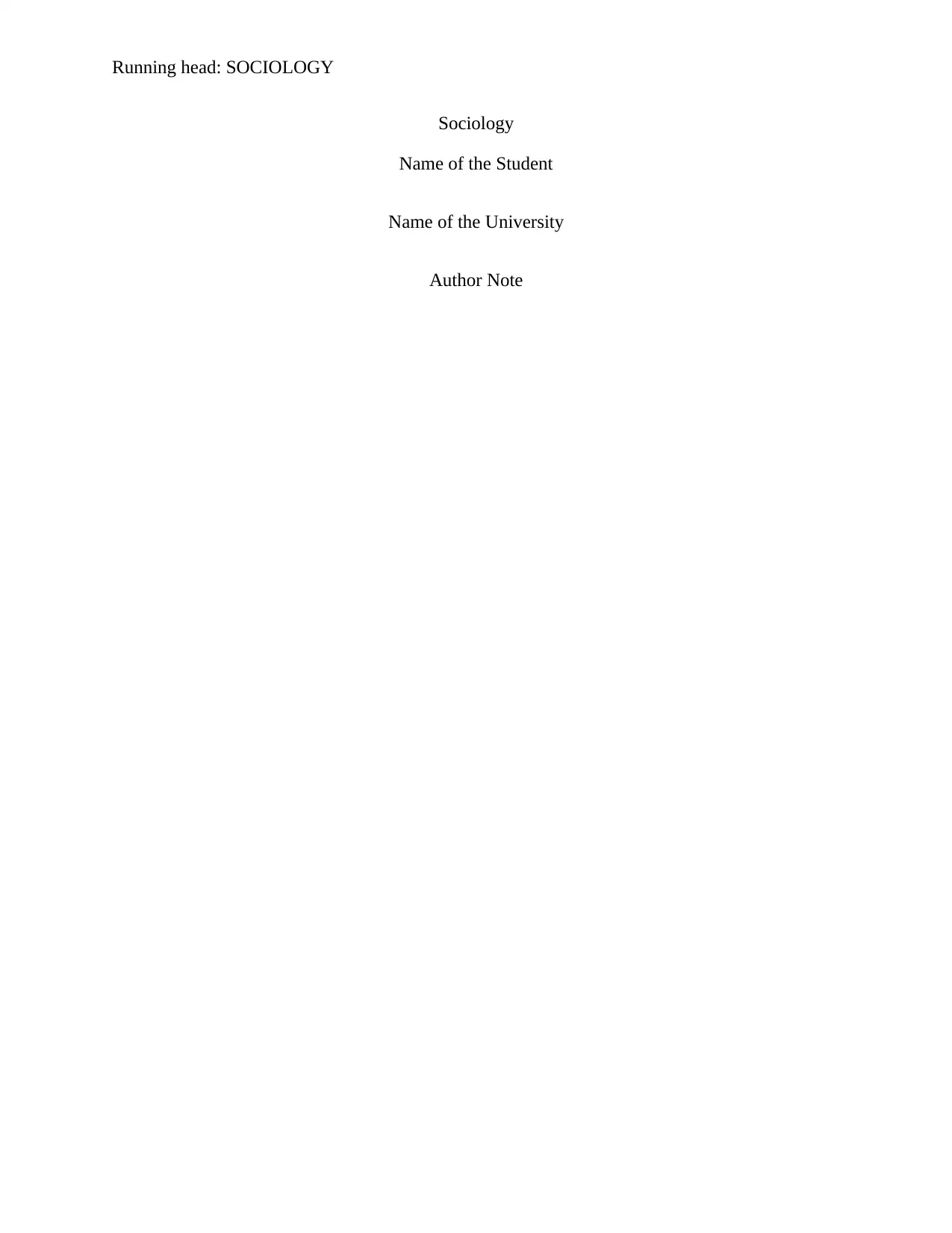
Running head: SOCIOLOGY
Sociology
Name of the Student
Name of the University
Author Note
Sociology
Name of the Student
Name of the University
Author Note
Paraphrase This Document
Need a fresh take? Get an instant paraphrase of this document with our AI Paraphraser
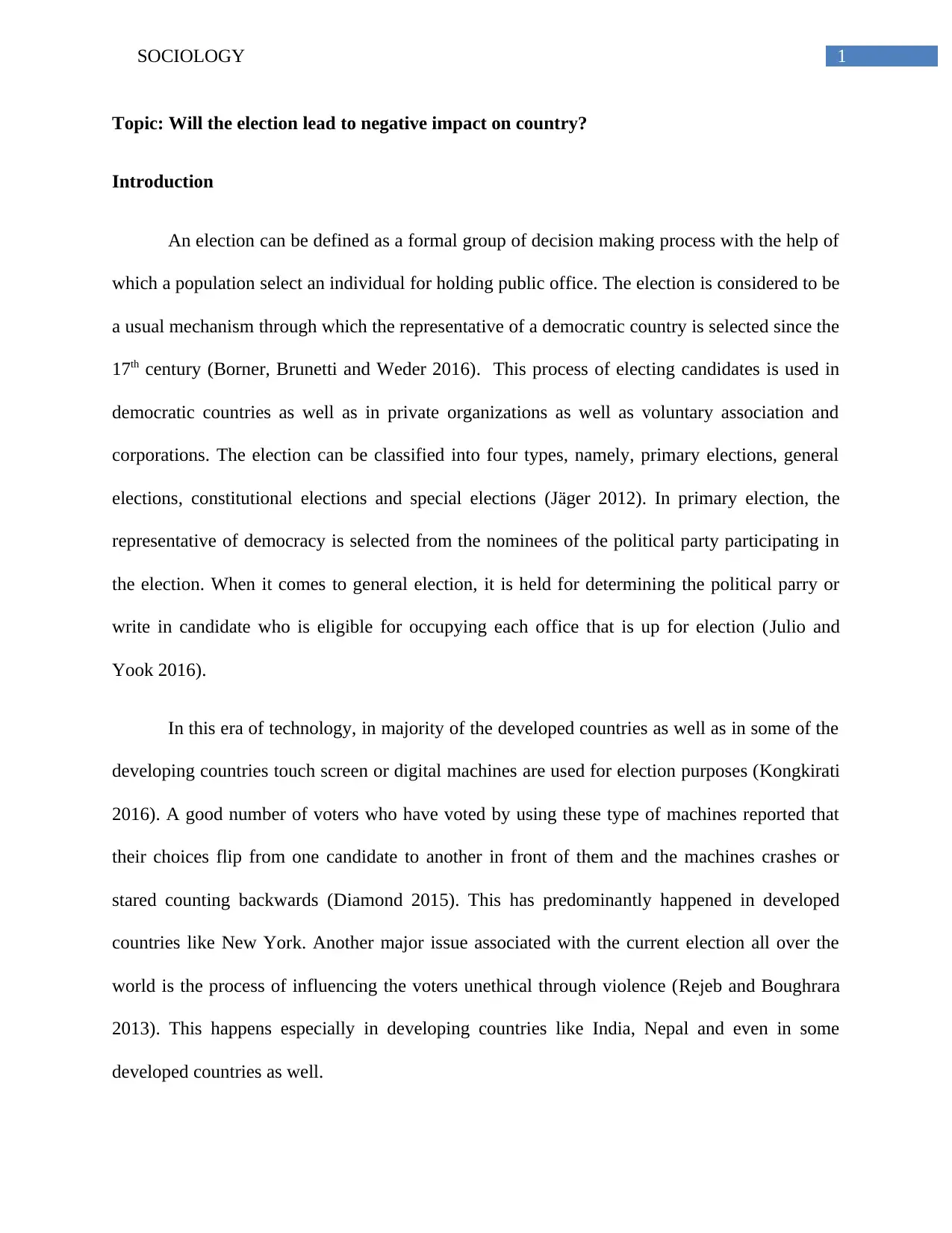
1SOCIOLOGY
Topic: Will the election lead to negative impact on country?
Introduction
An election can be defined as a formal group of decision making process with the help of
which a population select an individual for holding public office. The election is considered to be
a usual mechanism through which the representative of a democratic country is selected since the
17th century (Borner, Brunetti and Weder 2016). This process of electing candidates is used in
democratic countries as well as in private organizations as well as voluntary association and
corporations. The election can be classified into four types, namely, primary elections, general
elections, constitutional elections and special elections (Jäger 2012). In primary election, the
representative of democracy is selected from the nominees of the political party participating in
the election. When it comes to general election, it is held for determining the political parry or
write in candidate who is eligible for occupying each office that is up for election (Julio and
Yook 2016).
In this era of technology, in majority of the developed countries as well as in some of the
developing countries touch screen or digital machines are used for election purposes (Kongkirati
2016). A good number of voters who have voted by using these type of machines reported that
their choices flip from one candidate to another in front of them and the machines crashes or
stared counting backwards (Diamond 2015). This has predominantly happened in developed
countries like New York. Another major issue associated with the current election all over the
world is the process of influencing the voters unethical through violence (Rejeb and Boughrara
2013). This happens especially in developing countries like India, Nepal and even in some
developed countries as well.
Topic: Will the election lead to negative impact on country?
Introduction
An election can be defined as a formal group of decision making process with the help of
which a population select an individual for holding public office. The election is considered to be
a usual mechanism through which the representative of a democratic country is selected since the
17th century (Borner, Brunetti and Weder 2016). This process of electing candidates is used in
democratic countries as well as in private organizations as well as voluntary association and
corporations. The election can be classified into four types, namely, primary elections, general
elections, constitutional elections and special elections (Jäger 2012). In primary election, the
representative of democracy is selected from the nominees of the political party participating in
the election. When it comes to general election, it is held for determining the political parry or
write in candidate who is eligible for occupying each office that is up for election (Julio and
Yook 2016).
In this era of technology, in majority of the developed countries as well as in some of the
developing countries touch screen or digital machines are used for election purposes (Kongkirati
2016). A good number of voters who have voted by using these type of machines reported that
their choices flip from one candidate to another in front of them and the machines crashes or
stared counting backwards (Diamond 2015). This has predominantly happened in developed
countries like New York. Another major issue associated with the current election all over the
world is the process of influencing the voters unethical through violence (Rejeb and Boughrara
2013). This happens especially in developing countries like India, Nepal and even in some
developed countries as well.
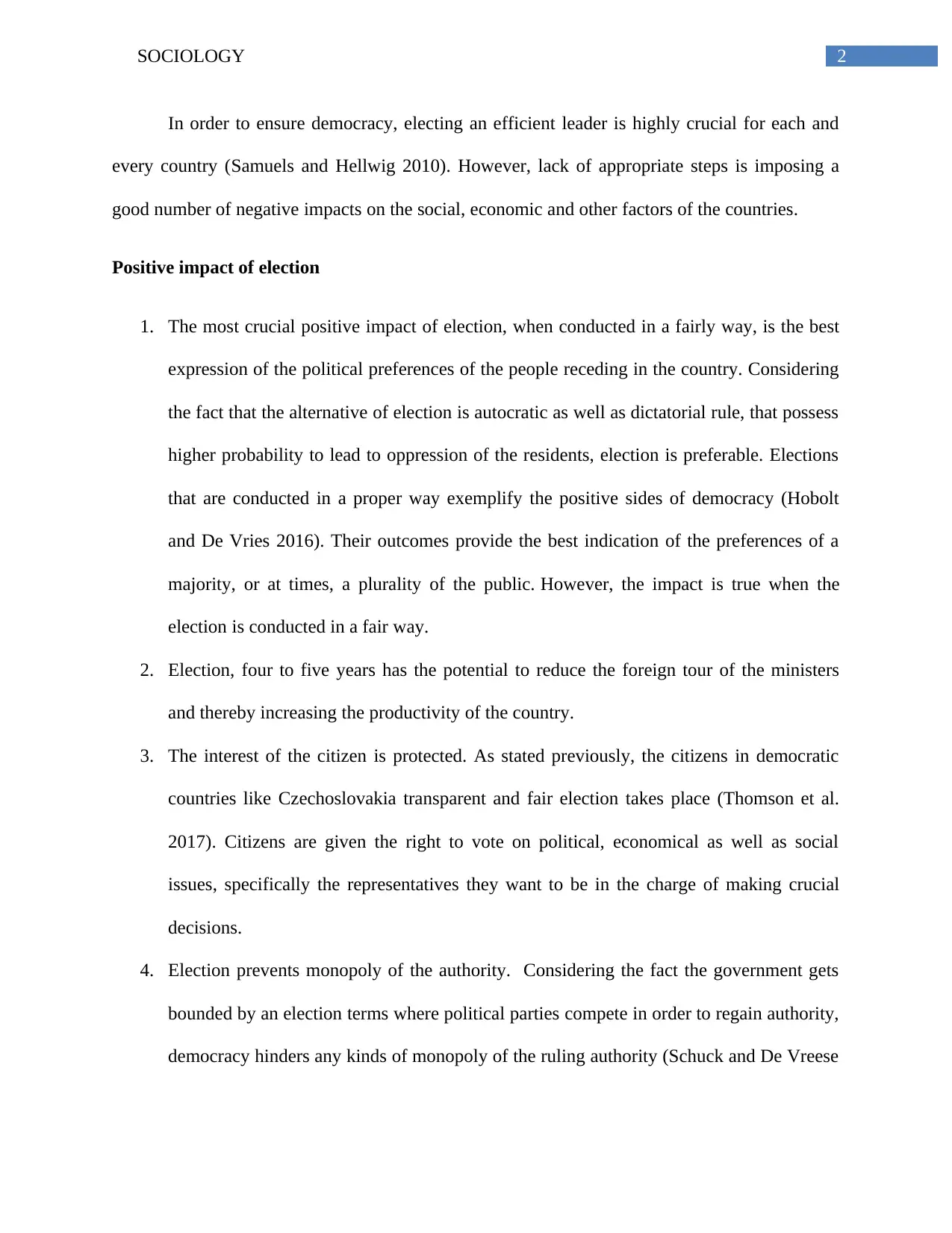
2SOCIOLOGY
In order to ensure democracy, electing an efficient leader is highly crucial for each and
every country (Samuels and Hellwig 2010). However, lack of appropriate steps is imposing a
good number of negative impacts on the social, economic and other factors of the countries.
Positive impact of election
1. The most crucial positive impact of election, when conducted in a fairly way, is the best
expression of the political preferences of the people receding in the country. Considering
the fact that the alternative of election is autocratic as well as dictatorial rule, that possess
higher probability to lead to oppression of the residents, election is preferable. Elections
that are conducted in a proper way exemplify the positive sides of democracy (Hobolt
and De Vries 2016). Their outcomes provide the best indication of the preferences of a
majority, or at times, a plurality of the public. However, the impact is true when the
election is conducted in a fair way.
2. Election, four to five years has the potential to reduce the foreign tour of the ministers
and thereby increasing the productivity of the country.
3. The interest of the citizen is protected. As stated previously, the citizens in democratic
countries like Czechoslovakia transparent and fair election takes place (Thomson et al.
2017). Citizens are given the right to vote on political, economical as well as social
issues, specifically the representatives they want to be in the charge of making crucial
decisions.
4. Election prevents monopoly of the authority. Considering the fact the government gets
bounded by an election terms where political parties compete in order to regain authority,
democracy hinders any kinds of monopoly of the ruling authority (Schuck and De Vreese
In order to ensure democracy, electing an efficient leader is highly crucial for each and
every country (Samuels and Hellwig 2010). However, lack of appropriate steps is imposing a
good number of negative impacts on the social, economic and other factors of the countries.
Positive impact of election
1. The most crucial positive impact of election, when conducted in a fairly way, is the best
expression of the political preferences of the people receding in the country. Considering
the fact that the alternative of election is autocratic as well as dictatorial rule, that possess
higher probability to lead to oppression of the residents, election is preferable. Elections
that are conducted in a proper way exemplify the positive sides of democracy (Hobolt
and De Vries 2016). Their outcomes provide the best indication of the preferences of a
majority, or at times, a plurality of the public. However, the impact is true when the
election is conducted in a fair way.
2. Election, four to five years has the potential to reduce the foreign tour of the ministers
and thereby increasing the productivity of the country.
3. The interest of the citizen is protected. As stated previously, the citizens in democratic
countries like Czechoslovakia transparent and fair election takes place (Thomson et al.
2017). Citizens are given the right to vote on political, economical as well as social
issues, specifically the representatives they want to be in the charge of making crucial
decisions.
4. Election prevents monopoly of the authority. Considering the fact the government gets
bounded by an election terms where political parties compete in order to regain authority,
democracy hinders any kinds of monopoly of the ruling authority (Schuck and De Vreese
⊘ This is a preview!⊘
Do you want full access?
Subscribe today to unlock all pages.

Trusted by 1+ million students worldwide
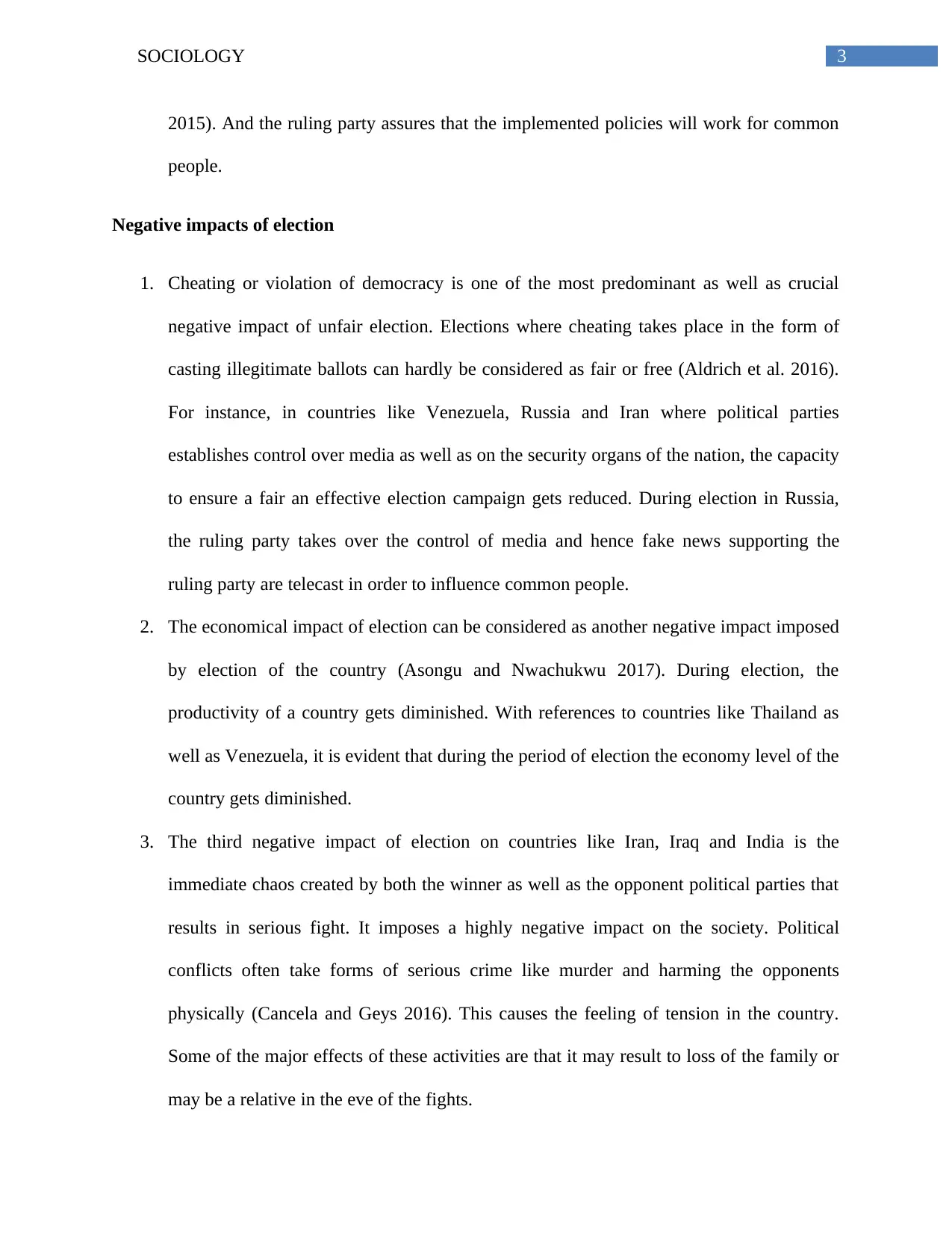
3SOCIOLOGY
2015). And the ruling party assures that the implemented policies will work for common
people.
Negative impacts of election
1. Cheating or violation of democracy is one of the most predominant as well as crucial
negative impact of unfair election. Elections where cheating takes place in the form of
casting illegitimate ballots can hardly be considered as fair or free (Aldrich et al. 2016).
For instance, in countries like Venezuela, Russia and Iran where political parties
establishes control over media as well as on the security organs of the nation, the capacity
to ensure a fair an effective election campaign gets reduced. During election in Russia,
the ruling party takes over the control of media and hence fake news supporting the
ruling party are telecast in order to influence common people.
2. The economical impact of election can be considered as another negative impact imposed
by election of the country (Asongu and Nwachukwu 2017). During election, the
productivity of a country gets diminished. With references to countries like Thailand as
well as Venezuela, it is evident that during the period of election the economy level of the
country gets diminished.
3. The third negative impact of election on countries like Iran, Iraq and India is the
immediate chaos created by both the winner as well as the opponent political parties that
results in serious fight. It imposes a highly negative impact on the society. Political
conflicts often take forms of serious crime like murder and harming the opponents
physically (Cancela and Geys 2016). This causes the feeling of tension in the country.
Some of the major effects of these activities are that it may result to loss of the family or
may be a relative in the eve of the fights.
2015). And the ruling party assures that the implemented policies will work for common
people.
Negative impacts of election
1. Cheating or violation of democracy is one of the most predominant as well as crucial
negative impact of unfair election. Elections where cheating takes place in the form of
casting illegitimate ballots can hardly be considered as fair or free (Aldrich et al. 2016).
For instance, in countries like Venezuela, Russia and Iran where political parties
establishes control over media as well as on the security organs of the nation, the capacity
to ensure a fair an effective election campaign gets reduced. During election in Russia,
the ruling party takes over the control of media and hence fake news supporting the
ruling party are telecast in order to influence common people.
2. The economical impact of election can be considered as another negative impact imposed
by election of the country (Asongu and Nwachukwu 2017). During election, the
productivity of a country gets diminished. With references to countries like Thailand as
well as Venezuela, it is evident that during the period of election the economy level of the
country gets diminished.
3. The third negative impact of election on countries like Iran, Iraq and India is the
immediate chaos created by both the winner as well as the opponent political parties that
results in serious fight. It imposes a highly negative impact on the society. Political
conflicts often take forms of serious crime like murder and harming the opponents
physically (Cancela and Geys 2016). This causes the feeling of tension in the country.
Some of the major effects of these activities are that it may result to loss of the family or
may be a relative in the eve of the fights.
Paraphrase This Document
Need a fresh take? Get an instant paraphrase of this document with our AI Paraphraser
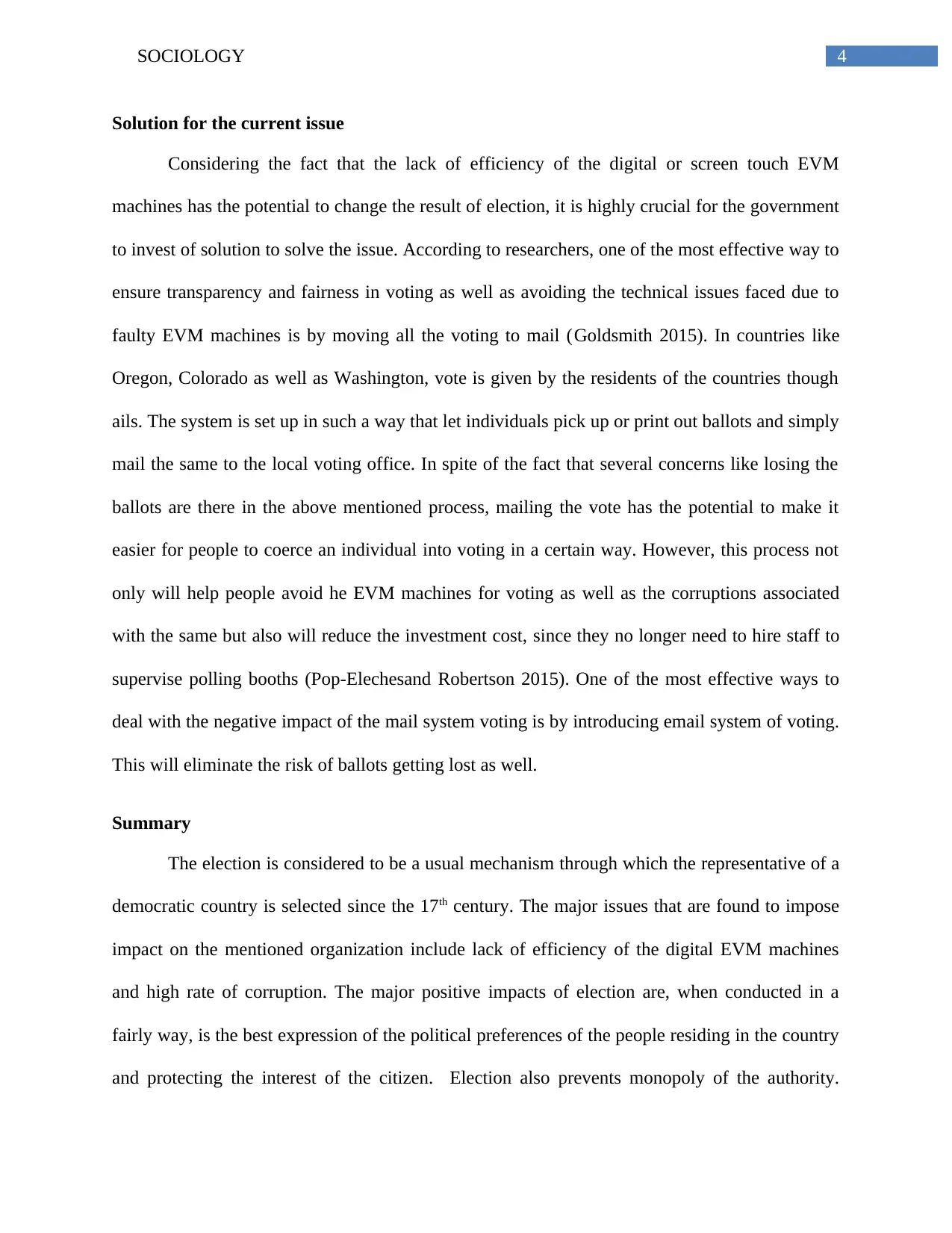
4SOCIOLOGY
Solution for the current issue
Considering the fact that the lack of efficiency of the digital or screen touch EVM
machines has the potential to change the result of election, it is highly crucial for the government
to invest of solution to solve the issue. According to researchers, one of the most effective way to
ensure transparency and fairness in voting as well as avoiding the technical issues faced due to
faulty EVM machines is by moving all the voting to mail (Goldsmith 2015). In countries like
Oregon, Colorado as well as Washington, vote is given by the residents of the countries though
ails. The system is set up in such a way that let individuals pick up or print out ballots and simply
mail the same to the local voting office. In spite of the fact that several concerns like losing the
ballots are there in the above mentioned process, mailing the vote has the potential to make it
easier for people to coerce an individual into voting in a certain way. However, this process not
only will help people avoid he EVM machines for voting as well as the corruptions associated
with the same but also will reduce the investment cost, since they no longer need to hire staff to
supervise polling booths (Pop-Elechesand Robertson 2015). One of the most effective ways to
deal with the negative impact of the mail system voting is by introducing email system of voting.
This will eliminate the risk of ballots getting lost as well.
Summary
The election is considered to be a usual mechanism through which the representative of a
democratic country is selected since the 17th century. The major issues that are found to impose
impact on the mentioned organization include lack of efficiency of the digital EVM machines
and high rate of corruption. The major positive impacts of election are, when conducted in a
fairly way, is the best expression of the political preferences of the people residing in the country
and protecting the interest of the citizen. Election also prevents monopoly of the authority.
Solution for the current issue
Considering the fact that the lack of efficiency of the digital or screen touch EVM
machines has the potential to change the result of election, it is highly crucial for the government
to invest of solution to solve the issue. According to researchers, one of the most effective way to
ensure transparency and fairness in voting as well as avoiding the technical issues faced due to
faulty EVM machines is by moving all the voting to mail (Goldsmith 2015). In countries like
Oregon, Colorado as well as Washington, vote is given by the residents of the countries though
ails. The system is set up in such a way that let individuals pick up or print out ballots and simply
mail the same to the local voting office. In spite of the fact that several concerns like losing the
ballots are there in the above mentioned process, mailing the vote has the potential to make it
easier for people to coerce an individual into voting in a certain way. However, this process not
only will help people avoid he EVM machines for voting as well as the corruptions associated
with the same but also will reduce the investment cost, since they no longer need to hire staff to
supervise polling booths (Pop-Elechesand Robertson 2015). One of the most effective ways to
deal with the negative impact of the mail system voting is by introducing email system of voting.
This will eliminate the risk of ballots getting lost as well.
Summary
The election is considered to be a usual mechanism through which the representative of a
democratic country is selected since the 17th century. The major issues that are found to impose
impact on the mentioned organization include lack of efficiency of the digital EVM machines
and high rate of corruption. The major positive impacts of election are, when conducted in a
fairly way, is the best expression of the political preferences of the people residing in the country
and protecting the interest of the citizen. Election also prevents monopoly of the authority.
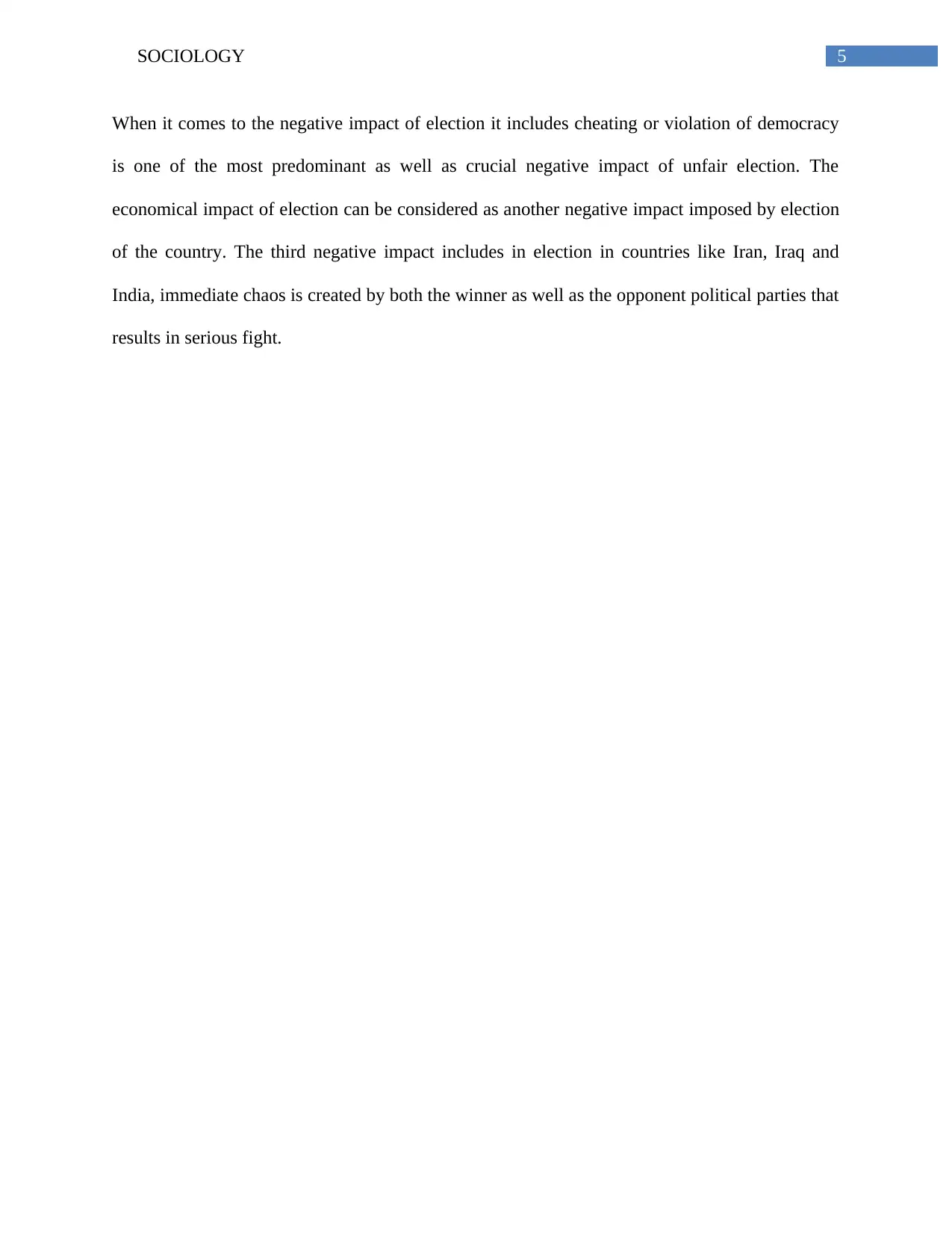
5SOCIOLOGY
When it comes to the negative impact of election it includes cheating or violation of democracy
is one of the most predominant as well as crucial negative impact of unfair election. The
economical impact of election can be considered as another negative impact imposed by election
of the country. The third negative impact includes in election in countries like Iran, Iraq and
India, immediate chaos is created by both the winner as well as the opponent political parties that
results in serious fight.
When it comes to the negative impact of election it includes cheating or violation of democracy
is one of the most predominant as well as crucial negative impact of unfair election. The
economical impact of election can be considered as another negative impact imposed by election
of the country. The third negative impact includes in election in countries like Iran, Iraq and
India, immediate chaos is created by both the winner as well as the opponent political parties that
results in serious fight.
⊘ This is a preview!⊘
Do you want full access?
Subscribe today to unlock all pages.

Trusted by 1+ million students worldwide
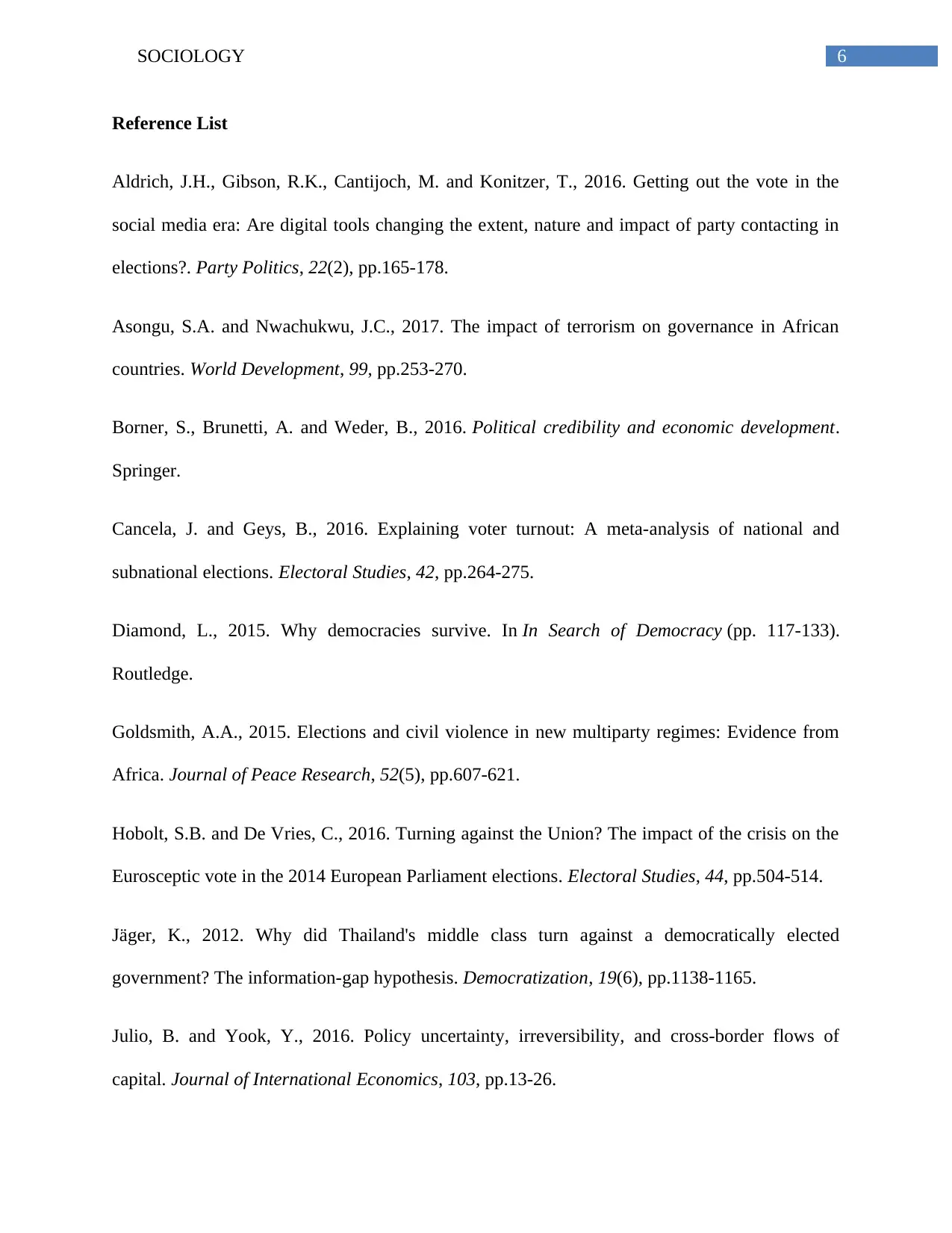
6SOCIOLOGY
Reference List
Aldrich, J.H., Gibson, R.K., Cantijoch, M. and Konitzer, T., 2016. Getting out the vote in the
social media era: Are digital tools changing the extent, nature and impact of party contacting in
elections?. Party Politics, 22(2), pp.165-178.
Asongu, S.A. and Nwachukwu, J.C., 2017. The impact of terrorism on governance in African
countries. World Development, 99, pp.253-270.
Borner, S., Brunetti, A. and Weder, B., 2016. Political credibility and economic development.
Springer.
Cancela, J. and Geys, B., 2016. Explaining voter turnout: A meta-analysis of national and
subnational elections. Electoral Studies, 42, pp.264-275.
Diamond, L., 2015. Why democracies survive. In In Search of Democracy (pp. 117-133).
Routledge.
Goldsmith, A.A., 2015. Elections and civil violence in new multiparty regimes: Evidence from
Africa. Journal of Peace Research, 52(5), pp.607-621.
Hobolt, S.B. and De Vries, C., 2016. Turning against the Union? The impact of the crisis on the
Eurosceptic vote in the 2014 European Parliament elections. Electoral Studies, 44, pp.504-514.
Jäger, K., 2012. Why did Thailand's middle class turn against a democratically elected
government? The information-gap hypothesis. Democratization, 19(6), pp.1138-1165.
Julio, B. and Yook, Y., 2016. Policy uncertainty, irreversibility, and cross-border flows of
capital. Journal of International Economics, 103, pp.13-26.
Reference List
Aldrich, J.H., Gibson, R.K., Cantijoch, M. and Konitzer, T., 2016. Getting out the vote in the
social media era: Are digital tools changing the extent, nature and impact of party contacting in
elections?. Party Politics, 22(2), pp.165-178.
Asongu, S.A. and Nwachukwu, J.C., 2017. The impact of terrorism on governance in African
countries. World Development, 99, pp.253-270.
Borner, S., Brunetti, A. and Weder, B., 2016. Political credibility and economic development.
Springer.
Cancela, J. and Geys, B., 2016. Explaining voter turnout: A meta-analysis of national and
subnational elections. Electoral Studies, 42, pp.264-275.
Diamond, L., 2015. Why democracies survive. In In Search of Democracy (pp. 117-133).
Routledge.
Goldsmith, A.A., 2015. Elections and civil violence in new multiparty regimes: Evidence from
Africa. Journal of Peace Research, 52(5), pp.607-621.
Hobolt, S.B. and De Vries, C., 2016. Turning against the Union? The impact of the crisis on the
Eurosceptic vote in the 2014 European Parliament elections. Electoral Studies, 44, pp.504-514.
Jäger, K., 2012. Why did Thailand's middle class turn against a democratically elected
government? The information-gap hypothesis. Democratization, 19(6), pp.1138-1165.
Julio, B. and Yook, Y., 2016. Policy uncertainty, irreversibility, and cross-border flows of
capital. Journal of International Economics, 103, pp.13-26.
Paraphrase This Document
Need a fresh take? Get an instant paraphrase of this document with our AI Paraphraser
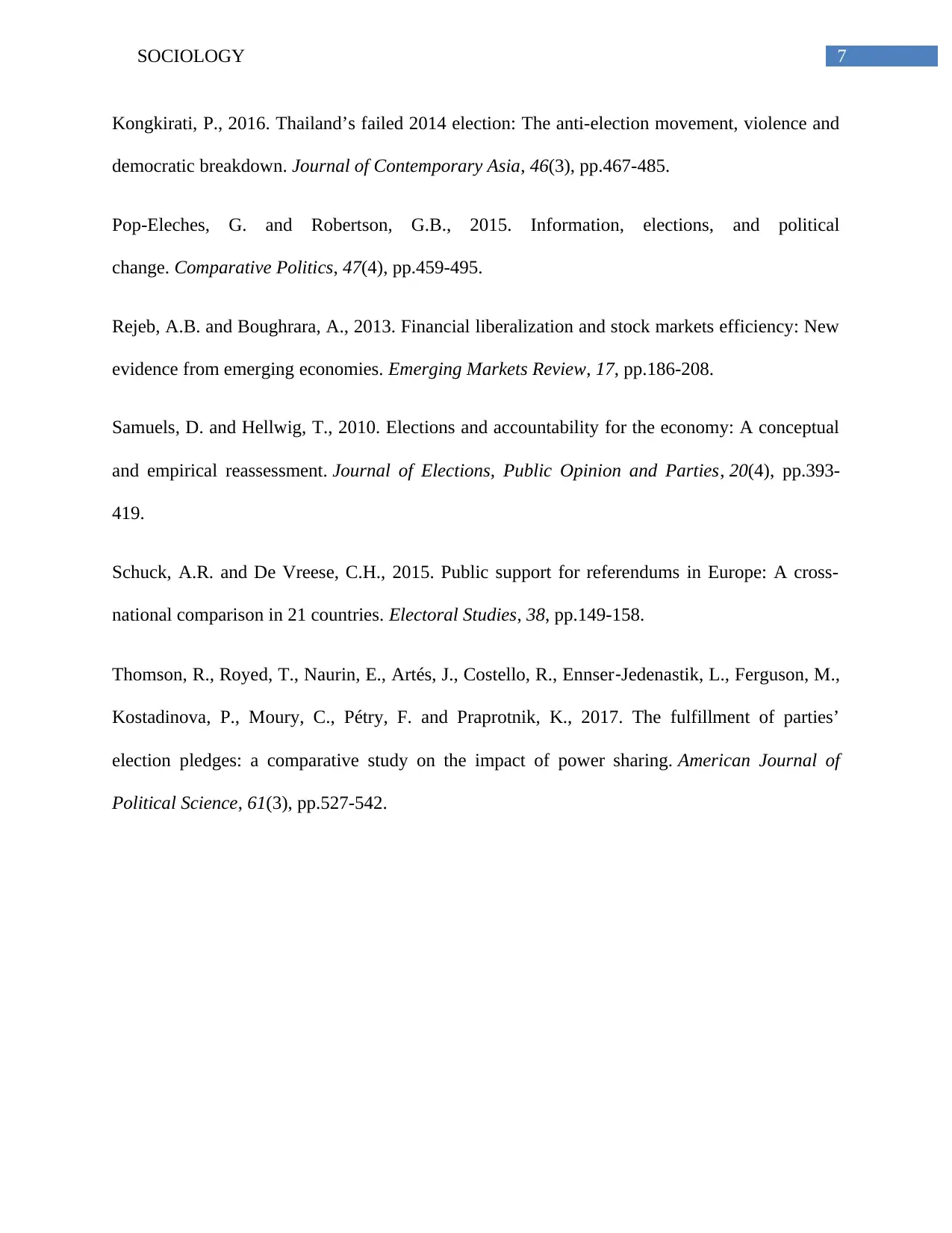
7SOCIOLOGY
Kongkirati, P., 2016. Thailand’s failed 2014 election: The anti-election movement, violence and
democratic breakdown. Journal of Contemporary Asia, 46(3), pp.467-485.
Pop-Eleches, G. and Robertson, G.B., 2015. Information, elections, and political
change. Comparative Politics, 47(4), pp.459-495.
Rejeb, A.B. and Boughrara, A., 2013. Financial liberalization and stock markets efficiency: New
evidence from emerging economies. Emerging Markets Review, 17, pp.186-208.
Samuels, D. and Hellwig, T., 2010. Elections and accountability for the economy: A conceptual
and empirical reassessment. Journal of Elections, Public Opinion and Parties, 20(4), pp.393-
419.
Schuck, A.R. and De Vreese, C.H., 2015. Public support for referendums in Europe: A cross-
national comparison in 21 countries. Electoral Studies, 38, pp.149-158.
Thomson, R., Royed, T., Naurin, E., Artés, J., Costello, R., Ennser‐Jedenastik, L., Ferguson, M.,
Kostadinova, P., Moury, C., Pétry, F. and Praprotnik, K., 2017. The fulfillment of parties’
election pledges: a comparative study on the impact of power sharing. American Journal of
Political Science, 61(3), pp.527-542.
Kongkirati, P., 2016. Thailand’s failed 2014 election: The anti-election movement, violence and
democratic breakdown. Journal of Contemporary Asia, 46(3), pp.467-485.
Pop-Eleches, G. and Robertson, G.B., 2015. Information, elections, and political
change. Comparative Politics, 47(4), pp.459-495.
Rejeb, A.B. and Boughrara, A., 2013. Financial liberalization and stock markets efficiency: New
evidence from emerging economies. Emerging Markets Review, 17, pp.186-208.
Samuels, D. and Hellwig, T., 2010. Elections and accountability for the economy: A conceptual
and empirical reassessment. Journal of Elections, Public Opinion and Parties, 20(4), pp.393-
419.
Schuck, A.R. and De Vreese, C.H., 2015. Public support for referendums in Europe: A cross-
national comparison in 21 countries. Electoral Studies, 38, pp.149-158.
Thomson, R., Royed, T., Naurin, E., Artés, J., Costello, R., Ennser‐Jedenastik, L., Ferguson, M.,
Kostadinova, P., Moury, C., Pétry, F. and Praprotnik, K., 2017. The fulfillment of parties’
election pledges: a comparative study on the impact of power sharing. American Journal of
Political Science, 61(3), pp.527-542.

8SOCIOLOGY
⊘ This is a preview!⊘
Do you want full access?
Subscribe today to unlock all pages.

Trusted by 1+ million students worldwide
1 out of 9
Related Documents
Your All-in-One AI-Powered Toolkit for Academic Success.
+13062052269
info@desklib.com
Available 24*7 on WhatsApp / Email
![[object Object]](/_next/static/media/star-bottom.7253800d.svg)
Unlock your academic potential
Copyright © 2020–2026 A2Z Services. All Rights Reserved. Developed and managed by ZUCOL.





